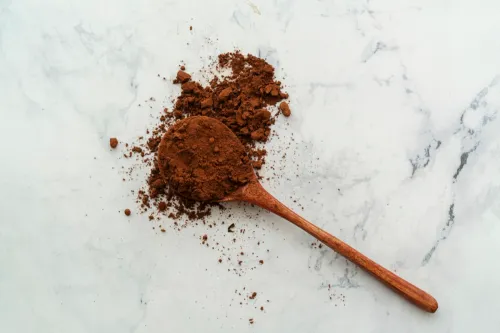The FDA Now Says Eating Some Chocolate May Reduce Your Heart Disease Risk

Chocolate is a craving many of us know all too well. The question isn’t if we’ll give in and have chocolate—it’s whether we’ll opt for ice cream, cookies, or candy bars to satisfy the desire. But while you might think of chocolate as a guilty indulgence, there’s some evidence that this sweet treat could have potential health benefits. And now, new insight from the U.S. Food and Drug Administration (FDA) is lending even more credence to the idea that chocolate may even play a role in reducing your risk of heart disease. Read on to learn more about the latest findings.
READ THIS NEXT: High Blood Pressure? Drinking 2 Cups of Coffee Daily Doubles Heart Disease Death Risk, New Study Finds.
Chocolate consumption is on the rise.

People have been consuming more chocolate in recent years. A 2021 survey from Cargill’s North American Cocoa and Chocolate team found that consumption was on the rise, Food Navigator reported.
Researchers surveyed 600 U.S. grocery shoppers and found that around one-third of consumers admitted they had increased their chocolate consumption as a result of the pandemic. The National Confectioners Association (NCA) also reported that grocery sales for chocolate were up by 17.9 percent in the past year, according to the news outlet.
“The adage that ‘everyone loves chocolate’ really is true—less than 3 percent of consumers report avoiding chocolate,” Gretchen Hadden, marketing lead for Cargill’s North American cocoa and chocolate business, said in a statement, per Food Navigator.
Three in four of those surveyed said they indulged in a daily chocolate treat to reward themselves. According to the survey, 72 percent also agreed that chocolate lifts their mood, while 59 percent said it boosts their energy and 52 percent said chocolate gets them through a tough day.
But what about the connection between chocolate and heart health?
Chocolate producers have been trying to prove claims about its health benefits.

At the same time, some chocolate producers have been working to get officials to recognize the health benefits of chocolate.
In 2018, Swiss chocolate manufacturer Barry Callebaut submitted a petition to the FDA, requesting that the agency “review a qualified health claim” about the ability for cocoa flavanols to lower someone’s risk of cardiovascular disease.
Flavonols are a type of plant nutrient found abundantly in cacao beans, which are fermented, dried, and roasted to create cocoa powder that can then be used to make chocolate, Harvard Health explains.
A qualified health claim (QHC) “characterizes the relationship between a substance and a disease or health-related condition,” according to the FDA. Barry Callebaut’s petition pushed for the FDA to approve a claim on the link between the consumption of cocoa flavanols and a reduced risk of heart disease, so that the manufacturer could use it on its product labels.
“Supportive but inconclusive scientific evidence suggests that consuming at least 200 mg of cocoa flavanols daily, such as provided by high flavanol cocoa powder, or high flavanol semi-sweet or high flavanol dark chocolate, may reduce the risk of cardiovascular disease,” one of the proposed claims from Barry Callebaut reads.
For more health advice delivered straight to your inbox, sign up for our daily newsletter.
The FDA says some evidence supports the link between cocoa flavonols and lower heart disease risk.

The FDA has finally responded to the petition from Barry Callebaut following a four-year long review.
“After reviewing the petition and other evidence related to the proposed health claim, the FDA determined that there is very limited credible scientific evidence for a qualified health claim for cocoa flavanols in high flavanol cocoa powder and a reduced risk of cardiovascular disease,” the agency said on Feb. 3.
In a letter of enforcement discretion issued that same day, the FDA said it will not object to the use of certain QHCs in reference to the connection between high flavanol cocoa powder and a reduced risk of heart disease, as long as the claim is “appropriately worded so as not to mislead consumers and that other factors for the use of the claim are met.”
The agency provided four examples of QHCs that could be used in the label of conventional foods, as a result.
“Very limited scientific evidence suggests that consuming cocoa flavanols in high flavanol cocoa powder, which contains at least 4 percent of naturally conserved cocoa flavanols, may reduce the risk of cardiovascular disease,” one of the approved claims reads.
But the agency cautions against this claim for other types of chocolate.

According to the FDA’s letter, “no credible studies were identified” that supported a direct relationship between cocoa flavanols in high flavanol semi-sweet or dark chocolate and the reduction of cardiovascular disease. Instead, the two credible studies cited by the FDA only evaluated cocoa flavanols in high flavanol cocoa powder—leading the agency to approve claims solely for this concentrated form of chocolate.
“This data is especially important because semi-sweet [or] dark chocolate has much higher levels of calories, total fat, and saturated fat than cocoa powder, which could influence the effects on cardiovascular disease risk,” the FDA added.
Despite this stipulation, TJ Mulvihill, vice-president of marketing, North America at Barry Callebaut, said the new update is a “major milestone in the development of cocoa as an ingredient,” according to a statement on the company’s official website.
“We know U.S. consumers are becoming increasingly interested in how the foods they love impact both environmental and personal health” Mulvihill added. “We now know that, in combination with a balanced diet and a healthy lifestyle, consumption of cocoa flavanols in high flavanol cocoa powder may help support cardiovascular health.”